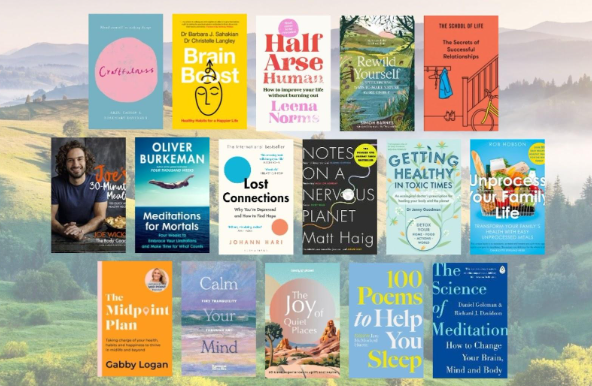
Self-improvement isn’t a single decision but a series of daily choices. One book can change how you see your habits. Another can push you to adjust your morning routine, while yet another might spark the motivation to eat better. The truth is simple: books transformed the health of many readers long before fitness apps and podcasts became mainstream. The written word still has power.
It’s tempting to believe that short social media posts or a 10-minute video will solve deep lifestyle challenges. But research tells another story. A Pew Research Center study found that nearly 65% of adults who read non-fiction in the past year said it influenced their personal decisions. Long-form content allows authors to dive into science, psychology, and practical advice with detail you just won’t find in a quick scroll. That depth is what makes personal growth books timeless.
You can get useful knowledge and motivation for a healthy lifestyle not only from complex scientific works. Sometimes it is better to just open the reading app and read billionaire romance novels online, which will inspire you better than any scientific books. If you have FictionMe at hand, then there will always be something to read and on any topic, for any mood.
One cannot speak of top self-improvement books without mentioning James Clear’s Atomic Habits. Its message? Small daily changes matter more than occasional grand gestures. Clear breaks down the science of habit loops in a way that anyone can apply. Readers report losing weight, improving sleep, or cutting out harmful routines simply by applying his “1% better every day” concept.
Another classic, The Power of Now by Eckhart Tolle, doesn’t talk about calories or exercise directly. Instead, it focuses on mental health and presence. Stress reduction, mindfulness, and inner calm play a role in physical health too. Chronic stress raises cortisol levels, which can lead to weight gain and fatigue. By learning to ground themselves in the moment, readers find they naturally support their physical well-being.
Books transformed the health of thousands by exposing hidden truths about food. Michael Pollan’s In Defense of Food offers a simple guideline: “Eat food. Not too much. Mostly plants.” It sounds almost too easy, but the book unpacks decades of food science and cultural habits. Studies show that diets high in processed food increase risks of obesity and heart disease, and Pollan’s clear-cut advice helps counter that.
On a more structured path, How Not to Die by Dr. Michael Greger dives into evidence-based nutrition. Every chapter targets a specific disease, explaining how certain foods may prevent or even reverse it. Readers often describe this book as a wake-up call, leading them to swap out processed snacks for whole grains, fruits, and vegetables.
Health is not only measured by the body. Mental clarity matters too. Books like The 7 Habits of Highly Effective People by Stephen Covey may not scream “fitness guide,” but they shape mindset. Covey’s approach to time management, responsibility, and balance directly influences stress levels. A calmer, more organized life often results in healthier choices without constant battles.
Carol S. Dweck’s Mindset introduces the concept of fixed vs. growth mindset. Why does this matter for health? If you believe your body or habits cannot change, you remain stuck. But if you adopt a growth mindset, failure at the gym or with a diet becomes feedback—not the end. Readers who apply this thinking often stick with healthier behaviors longer.
For those who crave movement, Spark: The Revolutionary New Science of Exercise and the Brain by John J. Ratey is groundbreaking. Ratey explores how exercise doesn’t just strengthen muscles but also rewires the brain. Regular physical activity improves focus, reduces depression, and even boosts learning. It’s a book that convinces people exercise is not optional—it’s vital.
Similarly, Born to Run by Christopher McDougall is half storytelling, half revelation. The book traces the running traditions of the Tarahumara people in Mexico. Readers finish it not just inspired but itching to lace up shoes and test their endurance. You can always check now to get more books on your smartphone that will motivate and guide you. This mix of narrative and science shows how fitness books can double as motivation tools.
One recurring theme in the top self-improvement books is that science supports lifestyle shifts. According to the American Psychological Association, about 40% of daily actions are habits, not conscious decisions. That statistic explains why so many of these books focus on routines, mindset, and consistency. You don’t win health by one-off efforts; you win it by shaping automatic behaviors.
Personal growth books like Charles Duhigg’s The Power of Habit dissect the neurological loops that control behavior. Once you understand triggers, actions, and rewards, you can redesign your life. Readers often use it to quit smoking, build morning exercise rituals, or reduce mindless snacking.
Not every book will resonate with every reader. Some need data-heavy arguments, while others thrive on motivational stories. A college student may connect with Atomic Habits, while a midlife reader might find more meaning in How Not to Die. The key is exploration. The journey through personal growth books isn’t about finding the single “magic” guide—it’s about collecting tools from different authors and weaving them into a personal system.
We live in an age of fast answers. Still, the slower act of reading a book may be the more effective tool for long-term transformation. By engaging with ideas at length, readers build the patience required for real lifestyle change. The best self-improvement books don’t just lecture; they guide, inspire, and challenge.
If you’ve ever wondered whether reading can make you healthier, the evidence is already stacked. Thousands share stories of how a single book reshaped their eating, fitness, or mindset. Health isn’t about instant fixes—it’s about steady personal growth. And sometimes, the first step begins by opening a page.